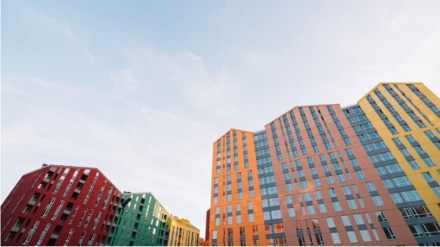The year 2025 will see commercial real estate continue to evolve, driven by technological advancements, changing consumer behaviour, and a growing focus on sustainability. The integration of artificial intelligence (AI), Internet of Things (IoT), robotics, and machine learning will improve efficiency and streamline processes. Simultaneously, sustainable certifications will become indispensable for both developers and occupiers, ensuring market relevance and helping achieve carbon neutrality goals.
Productivity-focused office designs to gain traction
The popularity of shared office spaces will persist, fostering collaboration and adaptability. Fusion designs that blend Indian and Western aesthetics, along with brand-themed office spaces, will reflect occupiers’ evolving needs. Wellness-oriented spaces like focus rooms, meditation zones, yoga studios, and gyms will continue to rule the roost, reducing absenteeism and boosting productivity at the workplace.
Biophilic design is expected to gain further traction in 2025, given its benefic impact on employees’ productivity and creativity.
Flexibility in office spaces will also gain momentum, with modular furniture and movable walls enabling cost-effective adjustments to office size.
Also Read: Tax Reforms and System Overhauls: Important financial changes set to take effect in 2025
Sustainability at the core of real estate
Sustainability will be at the core of real estate assets, from design to maintenance. The proportion of green-certified office buildings is expected to rise, with such spaces commanding rental premiums of 12-14% over non-green alternatives. These certifications are especially appealing to multinational corporations (MNCs) aligned with global carbon neutrality goals.
Sustainable practices in facility management will also gain traction. Transitioning to paperless documentation, using biodegradable materials, recycling waste, and implementing energy-efficient systems will reduce the carbon footprint. Preventive maintenance and green teams focused on raising awareness and monitoring emissions will further support sustainability efforts.
Addressing Labour Shortages with Technology
According to ManpowerGroup India’s Q4 2024 report, India’s real estate sector faces a deepening talent shortage, with a growing gap in skilled labour. This challenge is likely to accelerate the adoption of technology. Robots could efficiently perform repetitive tasks like painting and cutting, reducing reliance on manual labour. IoT-based sensors will become essential for real-time monitoring of construction progress and enhancing on-site safety.
PropTech platforms will evolve into comprehensive solutions addressing leasing, property management, carbon emission tracking, and secure transactions via blockchain. Immersive virtual property tours and personalized tenant experiences will streamline decision-making processes, while advanced facility management tools will ensure seamless operations.
Industrial Leasing and Quick Commerce
The rise of quick commerce is driving demand for dark stores and in-city warehouses. Evolving consumer preferences and the entry of new players into the sector will sustain this trend. Additionally, e-commerce growth in tier-2 and tier-3 cities, fuelled by increasing purchasing power, will further boost industrial real estate demand.
Future Outlook
The commercial real estate sector will remain resilient, with technology and sustainability shaping its future. As occupiers’ needs evolve and businesses strive for efficiency and environmental responsibility, the sector will adapt to meet these demands. Innovations in office design, sustainable practices, and PropTech will redefine the industry, making 2025 a transformative year for commercial real estate.
(By Shrinivas Rao, FRICS, CEO, Vestian)
Disclaimer: The views expressed are personal and do not reflect the official position or policy of FinancialExpress.com. Reproducing this content without permission is prohibited.
